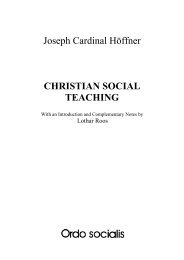Prof. Franz Josef Stegmann Bethlehem Social ... - Ordo Socialis
Prof. Franz Josef Stegmann Bethlehem Social ... - Ordo Socialis
Prof. Franz Josef Stegmann Bethlehem Social ... - Ordo Socialis
Create successful ePaper yourself
Turn your PDF publications into a flip-book with our unique Google optimized e-Paper software.
<strong>Stegmann</strong><br />
"Pay the Emperor what belongs to the Emperor, and pay God what belongs to God" (Mt<br />
22, 21).<br />
You may not read too much into this famous answer; it does not aim at our question directly.<br />
But Jesus made a clear distinction between both fields.<br />
The Pastoral Constitution of the Second Vatican Council, published in 1965, describes the<br />
independence of the profane spheres of life as follows: there is an "autonomy of earthly<br />
affairs" in the sense "that created things and societies themselves enjoy their own laws and<br />
values which must be gradually deciphered, put to use, and regulated by men". That<br />
autonomy "is not merely required by modern man, but harmonises also with the will of the<br />
Creator. For by the very circumstance of their having been created, all things are endowed<br />
with their own stability, truth, goodness, proper laws and order", which one "must respect".<br />
Focusing on this independence, the Council points the finger of criticism at the Church<br />
herself:<br />
"Consequently, we cannot but deplore certain habits of mind, sometimes found too among<br />
Christians, which do not sufficiently attend the rightful independence of science."<br />
In different ways, both texts say that "earthly affairs", human activities in these fields as well<br />
as state and economy, political and economic action, enjoy a real "autonomy". This "rightful<br />
independence" of the profane areas of life and the affirmation of the "worldly world" are new<br />
accents.<br />
It is true, the "autonomy of earthly affairs" is not to be understood in an absolute sense. Being,<br />
value and goodness befit "temporal affairs" insofar as they are created things, founded in the<br />
creative will of God and dependent on him. Nevertheless, it is indeed a "rightful<br />
independence", a real "autonomy". 10<br />
1.3 From a "divinised" to a "hominised" world<br />
The historical background of this new understanding of the world has been described by<br />
Johann Baptist Metz — one of the "fathers" of so-called Liberation Theology — as "the situation<br />
of change from a divinised to a hominised world". 11 For thousands of years, human<br />
beings believed themselves to be at the mercy of nature, but at the same time they felt themselves<br />
to be secure in it. Nature was therefore seen to be holy. It not only bore divine traits,<br />
but it seemed to be divine, to be like a god, even to be a god; it was "a divinised world". In<br />
modern times, however, things have changed fundamentally: to an increasing degree, the<br />
world and nature are shaped and formed by human beings to such an extent that we can say<br />
we live in "a hominised world".<br />
A reference from cultural history may indicate the huge change in the relationship between<br />
humans and world that has taken place in recent times. In the 26th canto (91-142) of the<br />
"Inferno" of the "Divina Comedia", the famous Italian poet Dante Alighieri (1265-1321)<br />
describes the last adventure of Ulysses or Odysseus which the ancient Greek poet Homer did<br />
not tell in his poem "Odyssey" and did not know about. After his return to the Island of<br />
Ithaka, the adventurer started again and sailed through the Straits of Gibraltar. Sailing into the<br />
wide ocean, he crossed the border which mortals are not allowed to cross". At the end of their<br />
"wild flight" - as Dante called the journey - a huge wave engulfed the ship and the whole<br />
Crew. Odysseus and his people did not cross the Limits set to humans without being<br />
10 Second Vatican Council, Pastoral Constitution (1965), Art. 36, 2,4,5.<br />
11 Johann Baptist Metz, Die Zukunft des Glaubens in einer hominisierten Welt, in: Johann Paptist Metz (Ed.),<br />
Weltverständnis im Glauben, Mainz 1965, 45‐62,46.<br />
7















